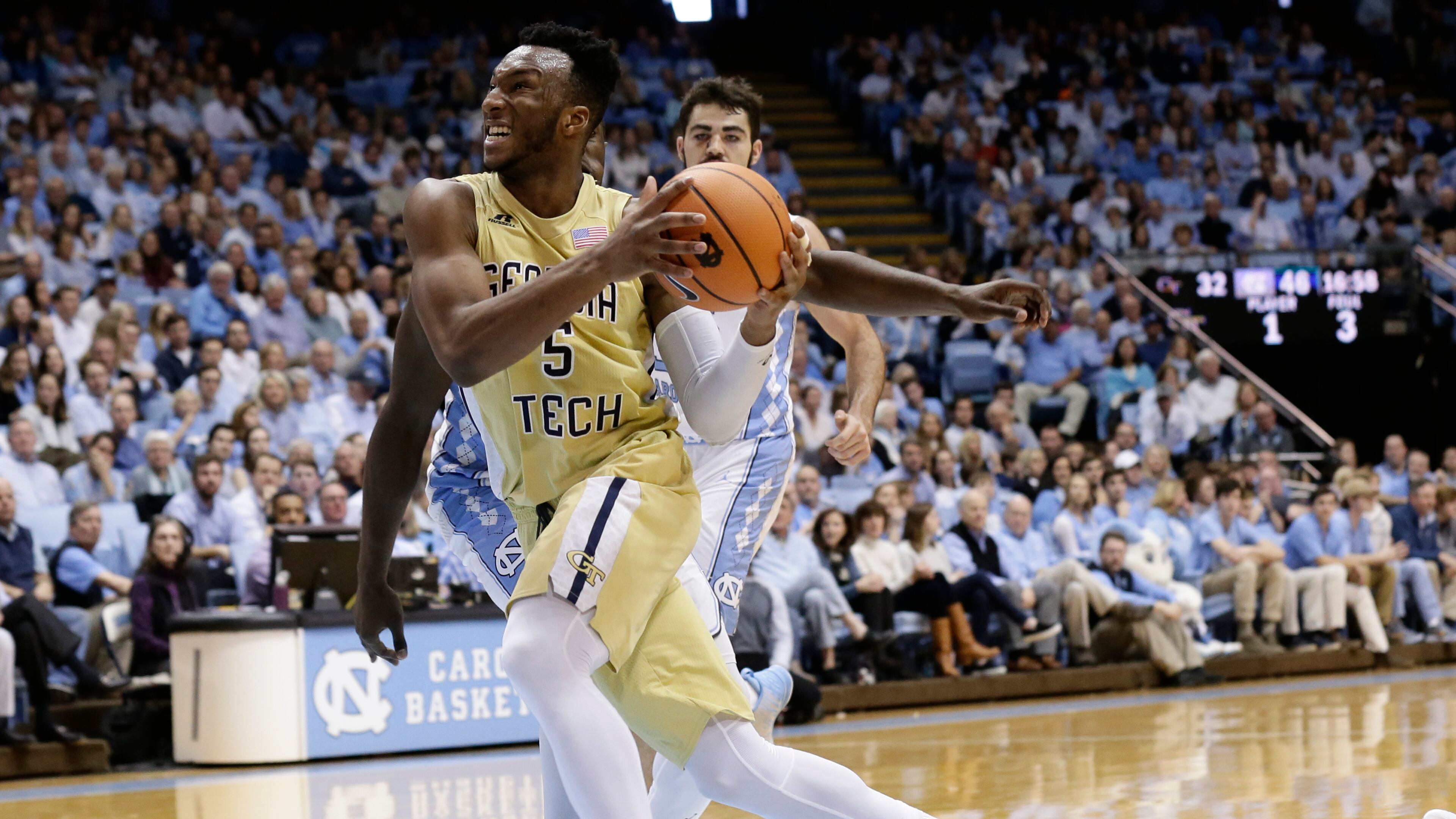Josh Okogie playing at All-ACC level

Georgia Tech doesn’t have much to celebrate at this point of the season, but what guard Josh Okogie is doing this season hasn’t been done in several years.
Entering the Yellow Jackets’ game against Virginia Tech on Saturday at McCamish Pavilion, Okogie is averaging 19.1 points per game. No Tech player has finished a season with a scoring average that high since Matt Harpring in 1997-98 (21.6). Were Okogie to finish the season at 19.1, it would be the highest rate for a sophomore since Kenny Anderson in the 1990-91 season (25.9). That’s not bad company – two of Tech’s all-time greats.
“I believe Josh is All-ACC,” coach Josh Pastner said Friday.
It’s not a hard argument to make. In ACC games, Okogie goes into the weekend ranked fourth in scoring in ACC games at 18.8 points per game. He also ranks 19th in rebounding at 6.8 per game, no small accomplishment for someone 6-foot-4. He’s one of only two players under 6-foot-6 among the top 25.
In 18 games, he has scored in double figures 17 times and gone for 20 or more on nine occasions. The most recent instance was Tech’s loss to Wake Forest on Wednesday, when he scored 20 in the loss to the Demon Deacons. His shot wasn’t falling – he was 5-for-13 and 0-for-4 from 3-point range – but he used his quickness and strength to get to the line, where he was 10-for-11. (He also ranks eighth in free-throw percentage in league games at 84.3 percent.)
“We couldn’t slow him down till he started picking up fouls,” said Wake Forest coach Danny Manning, who knows Okogie well, having been an assistant coach on the U.S. U-19 team that Okogie played for last summer.
Queried Friday, four writers who vote for the ACC’s 15-player all-conference team said they plan to include him on their ballots. None said they would not. If he is included, he would be Tech’s first sophomore All-ACC selection since Gani Lawal in the 2008-09 season.
Okogie has done what is not easy. After a strong freshman season (he was named to the conference’s all-freshman team), Okogie had high expectations going into this season and has met or surpassed them, despite a) missing several weeks of games and practices; b) playing on a team that has depended heavily upon him and against opponents defending him that way.
Further, he has provided leadership to a young team that has needed direction in a trying season.
The secret of Okogie’s performance is not much of one. The motor that has driven him to surpass the din projections held for him coming out of Shiloh High has been getting revved up at the Zelnak Center.
“He gets after it,” Pastner said. “He always gives you an honest effort.”
Okogie isn’t merely passing the eye test in practice. The Tech staff has players wear devices that are both heart-rate monitors and accelerometers. Okogie started off slowly after returning in mid-December from a dislocated finger that kept him out two additional games after he served a six-game NCAA suspension. But in recent weeks, Pastner said that Okogie has had the highest sprint numbers – frequency of going full speed during five-on-five play in practice – on the team.
“He’s winning the sprints,” Pastner said. “He’s sprinting at a high level. All that stuff matters in terms of how hard you’re practicing and everything else.”
Okogie said he checks the scores sometimes, but mostly is aware of how hard he’s pushing himself.
“Although (the numbers) weren’t where it could have been, I think in the last two weeks, last three weeks, I’ve done a great job of pushing myself past what I think I can reach,” he said. “Like they said, it’s shown up in the games.”
The effort is evident in his work on the glass. On Jan. 24, Okogie hauled in 16 rebounds against Florida State, tied for 12th all-time for a Tech player in an ACC game. Of the 11 players ahead of him, all were 6-8 or taller.
“How you practice is how you play,” Pastner said. “There’s a direct correlation.”
The load on Okogie has only increased with point guard Jose Alvarado’s season-ending elbow dislocation and fracture, suffered Sunday in the loss to Duke. Pastner moved Okogie to the point. His performance against Wake Forest wasn’t his best – he had one assist against four turnovers – but the whole team was having to adjust to being on the floor without Alvarado and with two new subs, forwards Evan Cole and Moses Wright.
“I had a couple miscues, a couple mishaps early, but as the game went on, it became easier and easier,” Okogie said.
Tech’s hopes to get some wins in the final five regular-season games and in the ACC Tournament in Brooklyn, N.Y., will depend to a large degree on Okogie’s capacity to continue to score while distributing to his teammates and organizing them at both ends of the floor.
“We need him to be near perfect for us every game because our margin for error is zero,” Pastner said.



